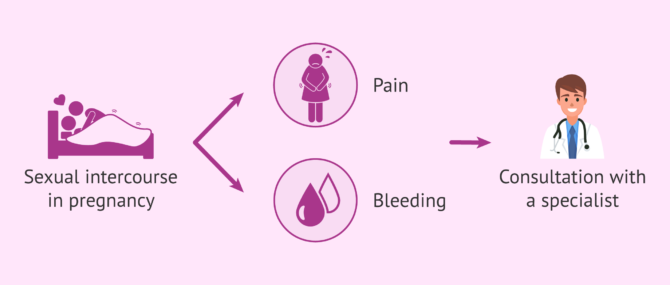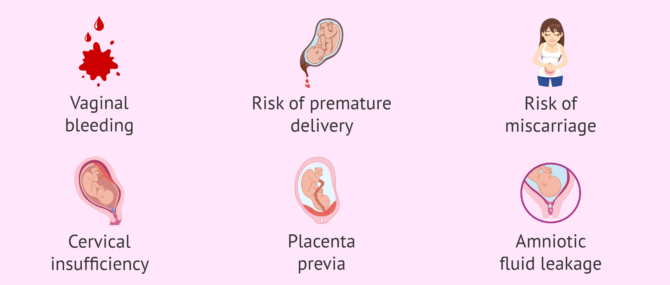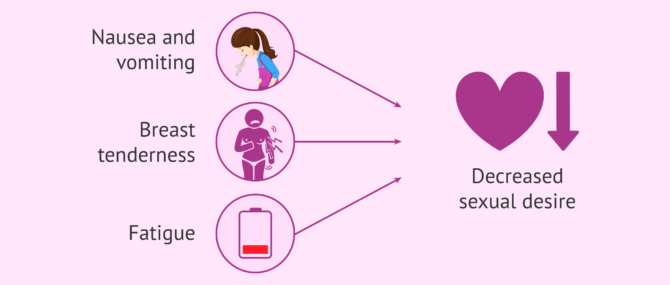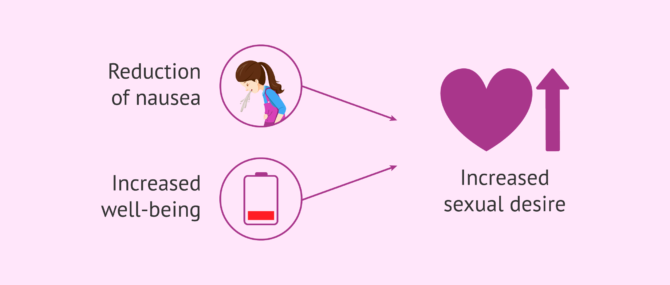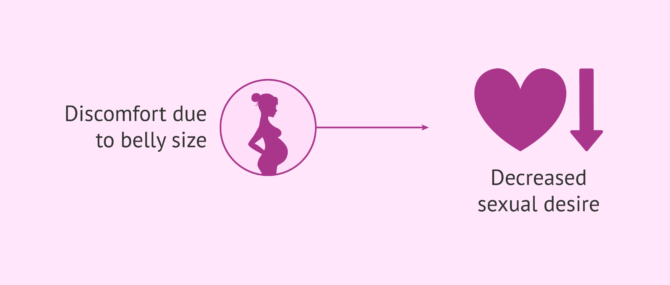Pregnancy is a very special time, but there are frequent doubts and concerns about what may affect the baby. In the case of sexual intercourse, many couples wonder if they can continue to have sex safely during pregnancy or if it could be harmful.
On the other hand, the significant physical and hormonal changes that women experience during pregnancy can cause their sexual desire to vary throughout gestation. However, each couple will experience it in a different way and communication between the two will be paramount.
Provided below is an index with the 7 points we are going to expand on in this article.
- 1.
- 2.
- 3.
- 3.1.
- 3.2.
- 3.3.
- 4.
- 4.1.
- 4.2.
- 4.3.
- 5.
- 6.
- 7.
is it safe to have sex during pregnancy?
Many couples avoid sexual activity during pregnancy for fear that it may harm the baby. However, the baby is inside the uterus and amniotic sac, surrounded and floating in the amniotic fluid, which also protects it.
In addition, the mucus plug that forms in the first weeks of pregnancy prevents the passage of microorganisms from the vagina to the uterus, which prevents possible infections.
The mucus plug is a mucous-like secretion that accumulates in the cervix in the first weeks of pregnancy and serves as a plug or barrier to prevent the ascent of microorganisms into the uterus during gestation.
Therefore, in general, sex can be practiced safely during pregnancy as long as the pregnancy is developing normally and without complications.
In any case, the specialist should be informed (before having sex again) if there is pain or bleeding during or after sexual intercourse.
When to avoid sexual intercourse during pregnancy?
The specialist may recommend that the pregnant woman not have sexual intercourse during pregnancy in the following situations:
- Vaginal bleeding of unknown cause.
- History of Premature birth.
- Risk of Premature birth
- History of spontaneous abortion.
- Risk (threat) of miscarriage.
- Cervical Insufficiency.
- Placenta previa.
- Amniotic fluid loss.
- Multiple pregnancy.
Thus, it is a good idea to consult the specialist who is handling the pregnancy if sexual relations can be maintained during pregnancy, especially if the pregnancy is risky. He is the one who best knows the particular situation of the woman or couple and will be able to give the precise recommendations.
Sexual desire and pregnancy
Pregnancy can cause a woman's sexual desire, and even that of her partner, to change. Therefore, good communication between the two is essential. Often, sexual desire undergoes changes during pregnancy in the following ways. However, every woman is different and it may also be perfectly normal for such variations not to occur.
First trimester
In the first trimester, the pregnant woman's mobility and agility will not yet have been affected because the increase in the belly due to gestation will not yet be very noticeable. Thus, the first trimester can be a good time to have sex comfortably and without the need for a great adaptation compared to before pregnancy.
However, the nausea and vomiting so typical of the first trimester of pregnancy, as well as breast tenderness, can decrease sexual desire in women, as they will be uncomfortable and may feel less energetic and more tired.
Second trimester
When the second trimester of pregnancy arrives, nausea and vomiting usually disappear and the woman feels better. This can bring a woman's sexual desire back to life. In addition, the increased blood flow to the pelvic area of the pregnant woman may lead to greater intensity in orgasm.
However, due to the changes in the pregnant woman's body, the couple will have to find a position that is comfortable for both of them, where no pressure is put on the belly.
On the other hand, these body changes in women can also lead to an increase in the sexual desire of her partner, who may be attracted by the new figure or by the increase in breast volume.
Third trimester
In the third trimester, the pregnant woman's sexual desire may decrease because of discomfort and discomfort due to the size that the belly has already reached.
Sexual intercourse during late pregnancy will require innovation and imagination to try positions that are comfortable and pleasurable for both partners, avoiding pressure on the woman's belly. Similarly, the woman should avoid lying on her back because of the pressure that the belly would exert on other organs and blood vessels due to its large size.
For this reason, communication remains key and will allow, in addition, to find an alternative in the case of not feeling comfortable with sexual relations such as kisses, hugs, caresses, massages... to share moments of intimacy.
FAQs from users
Should condoms be used during sexual intercourse during pregnancy?
The condom is a barrier method of contraception that prevents the transmission of sexually transmitted diseases (STDs). Therefore, it is advisable to use a condom during pregnancy to protect the health of the mother and baby. In addition, it is necessary to use a condom if you are going to have sex with a new sexual partner or if there is any risk of STD transmission.
What are the best positions for sex during pregnancy?
The best position for sexual intercourse during pregnancy is one in which both partners are comfortable. However, care should be taken not to put pressure on the woman's abdomen and the woman should avoid lying on her back, especially when the belly has reached a large size, to avoid pressure on the blood vessels and organs.
Some women feel more comfortable lying on top or on their side with their partner behind them.
Is sexual intercourse possible in the second month of pregnancy?
Pregnancy is not a situation that prevents sexual intercourse, nor will it pose a danger to the baby. The important thing is to find a position in which the pregnant woman is comfortable.
Suggested for you
Another important aspect that a woman or couple may wonder about is sex after childbirth. If you want to read about this topic, we recommend you to visit the following link: Postpartum sex.
On the other hand, it is common to worry about any complications that may occur during pregnancy. If you want to learn more about this topic, you can access this article: What are the most common pregnancy complications?
We make a great effort to provide you with the highest quality information.
🙏 Please share this article if you liked it. 💜💜 You help us continue!
References
Blumenstock SM, Barber JS. Sexual Intercourse Frequency During Pregnancy: Weekly Surveys Among 237 Young Women From A Random Population-Based Sample. J Sex Med. 2022 Oct;19(10):1524-1535. doi: 10.1016/j.jsxm.2022.07.006. Epub 2022 Aug 8. PMID: 35953427; PMCID: PMC9529844. (View)
Branecka-Woźniak D, Wójcik A, Błażejewska-Jaśkowiak J, Kurzawa R. Sexual and Life Satisfaction of Pregnant Women. Int J Environ Res Public Health. 2020 Aug 13;17(16):5894. doi: 10.3390/ijerph17165894. PMID: 32823797; PMCID: PMC7459482. (View)
Grussu P, Vicini B, Quatraro RM. Sexuality in the perinatal period: A systematic review of reviews and recommendations for practice. Sex Reprod Healthc. 2021 Dec;30:100668. doi: 10.1016/j.srhc.2021.100668. Epub 2021 Sep 11. PMID: 34563859. (View)
Jawed-Wessel S, Sevick E. The Impact of Pregnancy and Childbirth on Sexual Behaviors: A Systematic Review. J Sex Res. 2017 May-Jun;54(4-5):411-423. doi: 10.1080/00224499.2016.1274715. Epub 2017 Feb 6. PMID: 28166416. (View)
Kulhawik R, Zborowska K, Grabarek BO, Boroń D, Skrzypulec-Plinta V, Drosdzol-Cop A. Changes in the Sexual Behavior of Partners in Each Trimester of Pregnancy in Otwock in Polish Couples. Int J Environ Res Public Health. 2022 Mar 2;19(5):2921. doi: 10.3390/ijerph19052921. PMID: 35270613; PMCID: PMC8910547. (View)
MacPhedran SE. Sexual Activity Recommendations in High-Risk Pregnancies: What is the Evidence? Sex Med Rev. 2018 Jul;6(3):343-357. doi: 10.1016/j.sxmr.2018.01.004. Epub 2018 Mar 30. PMID: 29606552. (View)
Pereira EV, Belém JM, Alves MJH, Torquato JAS, Firmino PRA, Fialho AVM, Quirino GDS. Factors associated with sexual practices and positions performed by pregnant women: a cross-sectional study. Rev Bras Enferm. 2021 Nov 12;75(3):e20210162. English, Portuguese. doi: 10.1590/0034-7167-2021-0162. PMID: 34787238. (View)
Phan TC, Hoang LB, Tran TK, Pham TTT, Bui AV, Dao HT, Ngo TV, Tran CD. Fear-Related Reasons for Avoiding Sexual Intercourse in Early Pregnancy: A Cross-Sectional Study. Sex Med. 2021 Dec;9(6):100430. doi: 10.1016/j.esxm.2021.100430. Epub 2021 Oct 7. PMID: 34628113; PMCID: PMC8766271. (View)
Sagiv-Reiss DM, Birnbaum GE, Safir MP. Changes in sexual experiences and relationship quality during pregnancy. Arch Sex Behav. 2012 Oct;41(5):1241-51. doi: 10.1007/s10508-011-9839-9. Epub 2011 Sep 14. PMID: 21915742. (View)
Vannier SA, Rosen NO. Sexual Distress and Sexual Problems During Pregnancy: Associations With Sexual and Relationship Satisfaction. J Sex Med. 2017 Mar;14(3):387-395. doi: 10.1016/j.jsxm.2016.12.239. Epub 2017 Jan 28. PMID: 28143716. (View)
Zacharis K, Chrysafopoulou E, Kravvaritis S, Charitos T, Fouka A. Changes in sexual experiences and sexual satisfaction during pregnancy: data from a Greek secondary hospital. Pan Afr Med J. 2020 Dec 3;37:312. doi: 10.11604/pamj.2020.37.312.26813. PMID: 33654531; PMCID: PMC7896515. (View)
FAQs from users: 'Should condoms be used during sexual intercourse during pregnancy?', 'What are the best positions for sex during pregnancy?' and 'Is sexual intercourse possible in the second month of pregnancy?'.
